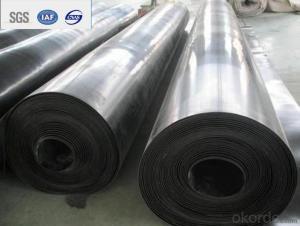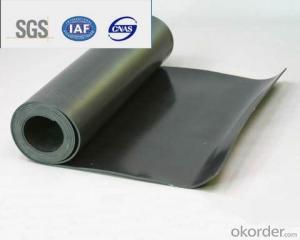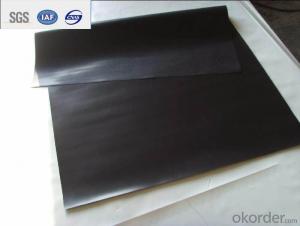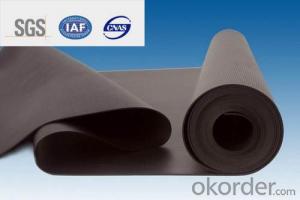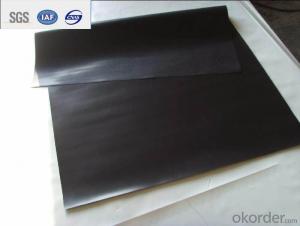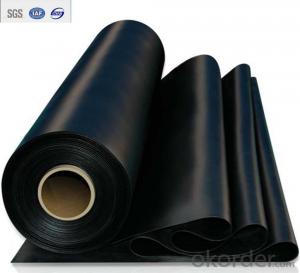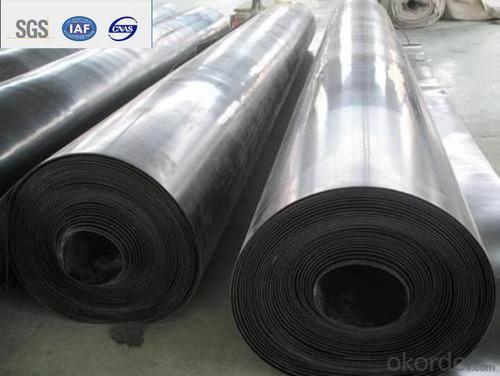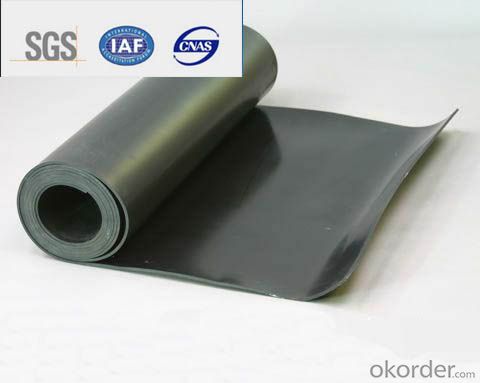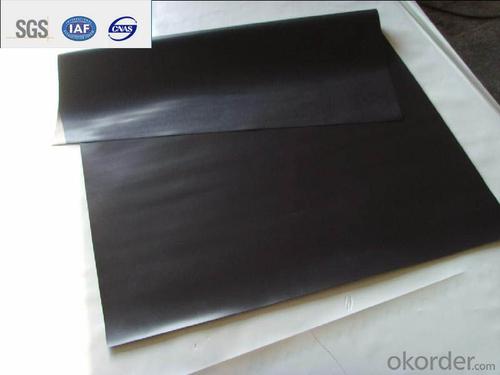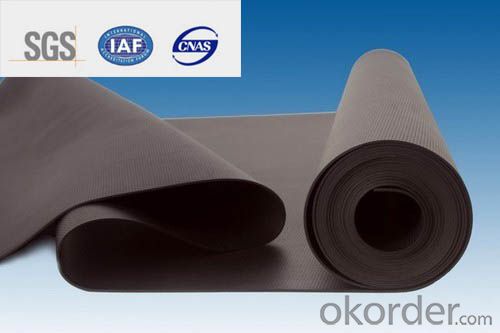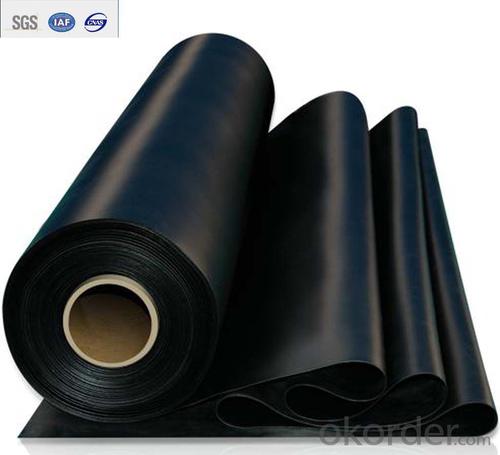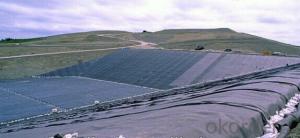EPDM Waterproofing Roofing Membrane with 1.2mm 2.0mm
- Loading Port:
- Qingdao
- Payment Terms:
- TT OR LC
- Min Order Qty:
- 2000 m²
- Supply Capability:
- 800000 m²/month
OKorder Service Pledge
OKorder Financial Service
You Might Also Like
Description Of EPDM Rubber Waterproof Membrane:
1. EPDM waterproof membrane is made from ternary ethylene-propylene rubber, which is for waterproofing of exposed and non-exposed applications.
2. EPDM waterproof membrane production adopts the world-advanced equipment of cold feeding extrusion and continuous vulcanization technology.
3. EPDM waterproof membrane is of high elasticity among high polymer waterproof materials and becomes a world-popular waterproofing material.
Main Features of EPDM Rubber Waterproof Membrane:
1. Excellent physical and mechanical performance
2. High tearing resistance
3. Good deformation adaptability
4. High puncture resistance
5. High aging resistance
6. UV resistance
Specifications of EPDM Rubber Waterproof Membrane:
Material | EPDM Rubber |
Size | 1.2m (width)*20m (length) or customized, weldable type 2.05m or 4m width |
Thick | 1.2mm, 1.5mm, 2.0mm |
Type | Vulcanized & Weldable |
Pattern | Non-reinforced (homogeneous) |
Certificate | ISO9001/14001 |
Applications of EPDM Rubber Waterproof Membrane:
1.Roofs, Basement, Toilets
2. Industrial and civil building waterproofing
3. Geosynthetic liner for swimming pool, channels, irrigation system
4. Especially suitable for projects with high requirements in durability, anti-corrosion and deformation.
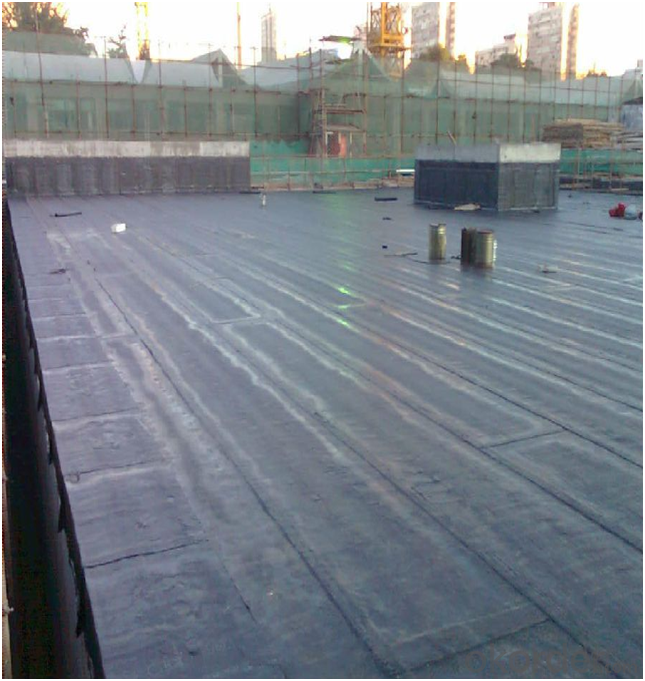
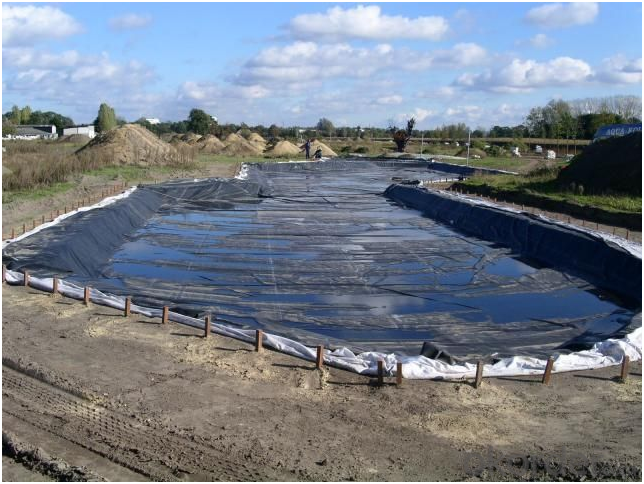
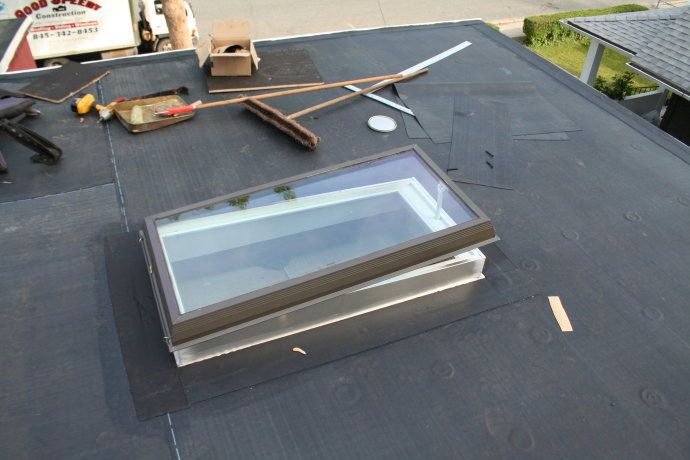
FAQ:
1. What are we supplying?
We are specialized in producing Colorful Asphalt Roof Shingle, SBS/APP modified bitumen waterproof membrane, Self adhesive bitumen waterproof membrane, PVC waterproofing membrane, EPDM rubber roofing membrane, Single Component Polyurethane Waterproof Coating, and Spray Polyurea Waterproof Coating.
2. How Many years experience do we have?
We have been exported to more than 20 countries in the past 15 years.
3. How long do we usually reply your request?
We always reply our customer within 24 hours.
- Q: Can a waterproofing membrane be used in fountains or water features?
- Yes, a waterproofing membrane can be used in fountains or water features. Waterproofing membranes are designed to create a barrier that prevents water from seeping through, making them ideal for applications where water containment is essential, such as fountains or water features.
- Q: How does a waterproofing membrane compare to other waterproofing methods?
- Compared to other traditional waterproofing methods, a waterproofing membrane stands out in several ways: 1. Unmatched Protection: When it comes to keeping water out, a waterproofing membrane is unparalleled. Unlike waterproof paints or coatings, which may crack or peel, a membrane forms a continuous and seamless barrier that can withstand extreme weather conditions. 2. Long-Lasting: Designed to be durable, waterproofing membranes are made from materials like rubber, PVC, or modified bitumen that resist wear and tear. This ensures that they provide a reliable waterproofing solution for many years. 3. Versatility at its Best: Waterproofing membranes can be applied to various surfaces, including concrete, metal, and wood. They are suitable for a wide range of applications such as roofs, basements, foundations, and tunnels, making them ideal for both residential and commercial projects. 4. Flexible and Adaptable: Thanks to their flexibility, waterproofing membranes conform to the shape and contours of the surface they are applied to. This quality allows them to accommodate any structural movements or shifts, preventing potential cracks or gaps that could lead to water leakage. 5. Easy to Install: Professionals or experienced DIYers can easily install waterproofing membranes. The process involves rolling out the membrane onto the surface, adhering it with adhesive or heat-welding, and sealing the edges and seams. This simplicity of installation makes it a popular choice for new construction and retrofit projects alike. 6. Cost-Effective Investment: Although the initial cost of installing a waterproofing membrane may be higher compared to other methods, its long-term cost-effectiveness makes it a wise investment. The durability and longevity of the membrane result in fewer maintenance and repair costs over time, saving money in the long run. In conclusion, a waterproofing membrane surpasses other waterproofing methods in terms of protection, longevity, versatility, flexibility, ease of installation, and cost-effectiveness. Its ability to provide a continuous and reliable barrier against water intrusion makes it the preferred choice for many construction projects.
- Q: Can a waterproofing membrane be used for a foundation wall damp proofing?
- Indeed, foundation wall damp proofing can be achieved by utilizing a waterproofing membrane. The purpose of a waterproofing membrane is to obstruct the flow of water, thus serving as a shield between the foundation wall and the adjacent soil. This protective shield aids in averting moisture seepage into the foundation wall, which can result in dampness and potential water harm. Through the application of a waterproofing membrane onto the foundation wall, an effective damp proofing is achieved, guarding it against water intrusion. Nevertheless, it is crucial to ensure that the installation of the waterproofing membrane is executed accurately, and that all joints and seams are adequately sealed to establish an uninterrupted barrier against water.
- Q: Do waterproofing membranes require maintenance?
- Yes, waterproofing membranes do require maintenance. While they are designed to provide long-lasting protection against water damage, regular maintenance is necessary to ensure their effectiveness. Over time, the membrane may develop cracks, tears, or other forms of damage that can compromise its waterproofing capabilities. Additionally, debris, dirt, and other substances can accumulate on the membrane's surface, obstructing drainage and causing water to pool. Therefore, it is important to inspect the membrane regularly and address any issues promptly. This may involve cleaning the surface, patching or replacing damaged sections, and resealing seams or joints to maintain a watertight barrier. Regular maintenance not only prolongs the lifespan of the waterproofing membrane but also helps prevent costly water damage to the underlying structure.
- Q: Are there any specific considerations for installing a waterproofing membrane on stucco surfaces?
- Yes, there are several specific considerations to keep in mind when installing a waterproofing membrane on stucco surfaces. Firstly, it is important to ensure that the stucco surface is clean and free of any dirt, debris, or loose material before applying the waterproofing membrane. This can be done by power washing or scrubbing the surface with a stiff brush and water. Secondly, it is crucial to choose the right type of waterproofing membrane that is suitable for stucco surfaces. There are various options available in the market, such as liquid-applied membranes, sheet membranes, or peel-and-stick membranes. It is essential to select a membrane that is compatible with stucco and provides a strong and durable barrier against water penetration. Another consideration is the proper application technique. The membrane should be applied evenly and smoothly, ensuring complete coverage over the entire stucco surface. It is important to follow the manufacturer's instructions and guidelines for the specific membrane being used. Additionally, it is recommended to pay attention to the details and transitions, such as around windows, doors, vents, or other penetrations. These areas are more prone to water infiltration, so it is important to properly seal and waterproof these vulnerable points using additional techniques or products, like flashing or caulking. Furthermore, it is essential to consider the climate and weather conditions in the area. If the stucco surface is exposed to extreme temperatures or frequent freeze-thaw cycles, it is advisable to choose a waterproofing membrane that can withstand these conditions and provide long-lasting protection. Lastly, regular inspection and maintenance of the waterproofing membrane is crucial to ensure its effectiveness over time. It is recommended to periodically check for any signs of damage, such as cracking, peeling, or bubbling, and promptly address any issues to prevent water infiltration and potential damage to the stucco surface. In conclusion, when installing a waterproofing membrane on stucco surfaces, it is important to clean the surface, choose the right type of membrane, apply it correctly, pay attention to details and transitions, consider the climate, and regularly inspect and maintain the membrane for long-lasting protection against water penetration.
- Q: Can a waterproofing membrane be used on aerated concrete block surfaces?
- Indeed, the application of a waterproofing membrane is viable for aerated concrete block surfaces. The permeable nature of aerated concrete blocks renders them susceptible to water infiltration. Employing a waterproofing membrane on the blocks' surface can effectively impede water penetration and avoid harm. The membrane establishes a barrier that obstructs water passage while still enabling the blocks to respire and eliminate any trapped moisture. This facilitates the preservation and longevity of the aerated concrete block structures. However, it is imperative to ensure that the waterproofing membrane selected is explicitly engineered for aerated concrete blocks, as diverse materials necessitate distinct types of membranes for optimal performance.
- Q: Can a waterproofing membrane be used for balconies and terraces?
- Yes, a waterproofing membrane can be used for balconies and terraces. Waterproofing membranes are often used in construction to protect these outdoor spaces from water damage and leakage. They provide an effective barrier against moisture and ensure the durability and longevity of balconies and terraces.
- Q: Are there any specific maintenance requirements for a waterproofing membrane?
- Yes, there are specific maintenance requirements for a waterproofing membrane. Regular inspections should be conducted to check for any signs of damage or deterioration, such as cracks or leaks. Any debris or standing water should be promptly removed to prevent potential damage. Additionally, it is important to follow the manufacturer's guidelines for cleaning and maintenance, which may include periodic cleaning with mild detergents and avoiding the use of harsh chemicals or abrasive cleaning tools.
- Q: Are waterproofing membranes suitable for tunnels?
- Tunnels can benefit from the use of waterproofing membranes. These structures often face significant water pressure from the surrounding soil and groundwater, making them susceptible to water entering. Waterproofing membranes are specifically designed to create a protective barrier that prevents water infiltration into the tunnel. These membranes are typically crafted from durable materials like bitumen, PVC, or EPDM rubber. These materials possess a resistance to water penetration, making them ideal for the task. Once applied to the tunnel walls and ceiling, they form a continuous and impermeable layer that effectively keeps the tunnel dry. Additionally, the membranes are flexible, allowing them to adjust to any movement or settlement within the tunnel while maintaining their waterproofing integrity. Apart from their water-blocking capabilities, these membranes offer other advantages for tunnels. They can shield the structure from corrosion caused by water and chemicals, thereby prolonging the tunnel's lifespan. Furthermore, they can improve the indoor air quality by preventing the growth of mold and mildew, which tend to thrive in damp environments. Moreover, waterproofing membranes can be tailored to suit the specific conditions of different tunnels. For instance, in tunnels exposed to high levels of hydrostatic pressure, reinforced membranes with greater tensile strength can be used to withstand the additional stress. Similarly, tunnels that prioritize fire safety can utilize membranes with enhanced fire resistance properties. In conclusion, waterproofing membranes provide a dependable and efficient solution for ensuring the durability, safety, and longevity of tunnels. By serving as a robust barrier against water ingress, they effectively safeguard these structures.
- Q: Can a waterproofing membrane be used for shower or bathroom installations?
- Yes, a waterproofing membrane can be used for shower or bathroom installations. The membrane acts as a protective barrier, preventing water from penetrating through the walls or floor and causing damage. It is commonly used in wet areas like showers and bathrooms to ensure a waterproof seal and to maintain the integrity of the surrounding surfaces.
Send your message to us
EPDM Waterproofing Roofing Membrane with 1.2mm 2.0mm
- Loading Port:
- Qingdao
- Payment Terms:
- TT OR LC
- Min Order Qty:
- 2000 m²
- Supply Capability:
- 800000 m²/month
OKorder Service Pledge
OKorder Financial Service
Similar products
Hot products
Hot Searches
Related keywords
